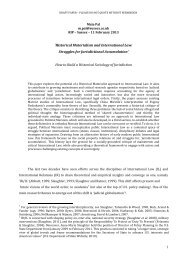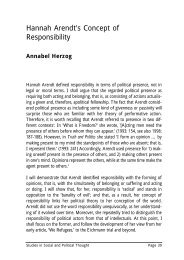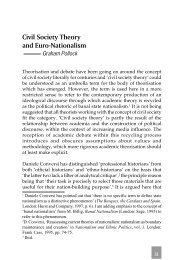Just a Matter of Choice? Student Mobility as - University of Sussex
Just a Matter of Choice? Student Mobility as - University of Sussex
Just a Matter of Choice? Student Mobility as - University of Sussex
Create successful ePaper yourself
Turn your PDF publications into a flip-book with our unique Google optimized e-Paper software.
l<strong>as</strong>t point, one might think <strong>of</strong> Hauke and<br />
Jakob again: if they had not come to<br />
experience their school stay abroad so<br />
positively in the end, they might have<br />
refrained from going abroad again later in<br />
their life. By pointing out that the<br />
acquisition <strong>of</strong> mobility capital results from<br />
the interplay <strong>of</strong> these different sources,<br />
Murphy-Lejeune (2002: 56-59) also warns<br />
against seeing family influence <strong>as</strong> too<br />
overbearing.<br />
Although Murphy-Lejeune mentions<br />
Bourdieu only in p<strong>as</strong>sing, there is some<br />
resemblance to his theoretical concepts –<br />
not le<strong>as</strong>t because <strong>of</strong> the term „capital‟,<br />
invoking his distinction between cultural,<br />
economic and social capital (Bourdieu<br />
1997). Indeed, Brooks and Waters (2010:<br />
154) suggest that mobility capital should be<br />
better „conceptualized <strong>as</strong> a form <strong>of</strong> capital<br />
which exists alongside the others identified<br />
by Bourdieu […] and which can be both<br />
converted into these other types and<br />
produced by them‟. More importantly<br />
though, it seems that given the way<br />
Murphy-Lejeune depicts the effect <strong>of</strong><br />
mobility capital – according to her, people<br />
with mobility capital dispose <strong>of</strong> a „t<strong>as</strong>te for<br />
living abroad‟, the „travel bug‟, an „appetite<br />
for wandering‟ (Murphy-Lejeune 2002: 51-<br />
52, 56, 59) – it should not just be thought<br />
<strong>of</strong> <strong>as</strong> a resource which people can draw<br />
upon <strong>as</strong> they like. Instead, it is essential to<br />
emph<strong>as</strong>ise its incorporated nature –<br />
analogous to Bourdieu‟s notion <strong>of</strong><br />
embodied cultural capital (Bourdieu 1997:<br />
48-50) – and conceptualise it <strong>as</strong> part <strong>of</strong> a<br />
person‟s habitus, <strong>as</strong> an internalised<br />
disposition. Only then is it comprehensible<br />
why the „urge to travel‟ (another expression<br />
used by Murphy-Lejeune to circumscribe<br />
the effect <strong>of</strong> mobility capital) should direct<br />
these young people towards further<br />
mobility, <strong>as</strong> Murphy-Lejeune argues (2002:<br />
52). 5 Seen that way, Murphy-Lejeune‟s<br />
concept helps us to understand why most<br />
<strong>of</strong> the respondents place so much<br />
emph<strong>as</strong>is on their previous mobility<br />
5 Having said that, the narrations <strong>of</strong> those interviewees in<br />
my sample with an international family background clearly<br />
do not show an „urge to travel‟; rather, living (and studying)<br />
abroad h<strong>as</strong> a certain taken-for-grantedness for them.<br />
experiences to bring across why they<br />
studied abroad. From their perspective,<br />
these encounters with other countries and<br />
cultures built an essential element <strong>of</strong> their<br />
biographical trajectory, whose importance<br />
can only be fully acknowledged when<br />
perceived <strong>as</strong> the result <strong>of</strong> a process by<br />
which a specific disposition had been<br />
formed, which in turn impacted on their<br />
further courses <strong>of</strong> action, urging them to<br />
seek out new mobility opportunities.<br />
The question remains, however, <strong>as</strong> to why<br />
the respondents ended up studying abroad<br />
and did not just travel from time to time or<br />
pursue a work placement abroad in order to<br />
satisfy the „travel bug‟. If one understands<br />
mobility capital <strong>as</strong> part <strong>of</strong> a person‟s<br />
habitus, it follows from Bourdieu‟s<br />
theoretical re<strong>as</strong>oning that the habitus is not<br />
something purely deterministic which would<br />
prescribe concrete actions. Rather, <strong>as</strong> „a<br />
system <strong>of</strong> dispositions, that is, <strong>of</strong><br />
virtualities, potentialities, eventualities‟<br />
(Bourdieu and Wacquant 1992: 135), the<br />
habitus allows for a range <strong>of</strong> actions which<br />
occur, furthermore, only in a similar way if<br />
the habitus „is confronted with objective<br />
conditions identical with or similar to those<br />
<strong>of</strong> which it is the product‟ (Bourdieu and<br />
Wacquant 1992: 129; for a more extensive<br />
discussion <strong>of</strong> his habitus concept see<br />
Bourdieu 1990). Thus, we need to take a<br />
closer look at other <strong>as</strong>pects and<br />
dimensions which supplement the effect <strong>of</strong><br />
mobility capital and play into the process <strong>of</strong><br />
becoming a mobile student.<br />
Going abroad <strong>as</strong> a socially embedded<br />
process<br />
Another striking characteristic <strong>of</strong> the<br />
respondents‟ narrations about how they<br />
became mobile students are references to<br />
other people, most <strong>of</strong>ten involving family<br />
members, friends, partners, teachers<br />
and/or lecturers at university. This<br />
resonates strongly with the argument<br />
brought forward by Brooks and Waters –<br />
directed against the prevalent notion <strong>of</strong> the<br />
individualised nature <strong>of</strong> transnational<br />
mobility in the existing literature – on the<br />
8

















